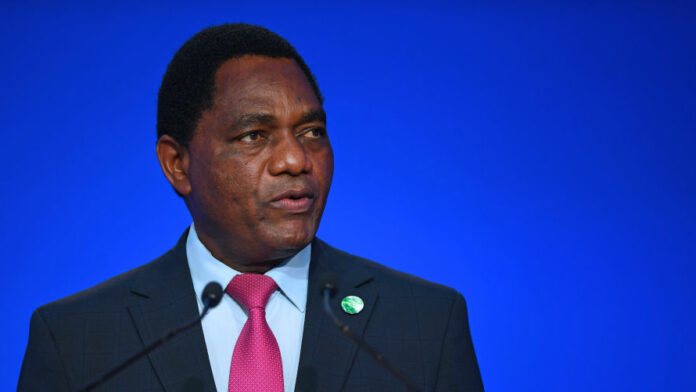
ANALYSTS anticipate that mining investors will flock to Zambia, still one of the biggest copper producers globally, especially since President Hakainde Hichilema came into office in August 2021 and announced a range of incentives, such as a sliding royalty rate for mines, to lure back investors.
Hichilema, or ‘HH’ as the investor community call him, has announced that he wants Zambia’s mining sector to be the country’s foremost revenue generator. He subsequently set a target to increase its copper production from 800,000 tons a year to three million tons a year in the next three years – a bold aim, especially since the Konkola and Mopani copper mines haven’t resumed production yet.
But overall, Zambia’s mining sector appears to be on track for renewed activity from international mining companies. In 2022, First Quantum Minerals announced $1.35bn worth of new projects in the country, while Anglo American announced a return to full-scale copper exploration after it signed a provisional joint-venture agreement with Aim-listed mining and exploration company Arc Minerals. In addition, KoBold Metals, a Californian-based metals explorer, is busy raising $200m to develop the copper reserves it recently acquired in Zambia, the Wall Street Journal reports.
The projects announced by both these miners are a sure vote of confidence in the Hichilema administration.
Exploration is an equally important aspect of Hichilema’s investment drive into Zambia’s minerals sector and the government is currently doing geological mapping for the remaining 45% of the country, while the existing 55% will be updated.
Unfortunately, Hichilema has also had to deal with numerous problems since he took over the reins from the Lungu presidency, an era in which mining companies faced insecurity of tenure, high royalty rates, and the withholding of VAT refunds.
Delivering on promises has been harder and slower than anticipated, says Marcus Courage, CEO of Africa Practice. It has involved drawn-out negotiations with creditors for debt restructuring, cleaning up the country’s cadastral system after widespread licensing corruption, restructuring Mopani, settling the Konkola disputes, and addressing the power crisis. “These things are all taking much longer than anticipated,” says Courage.
The mining cadastre was subject to a detailed audit over eight months. They went through every single major licence with a fine toothcomb and threw out those that hadn’t been properly awarded – Nick con Schirnding
The administration is doing its best to clean up various practices and set the country on a new course, says Nick von Schirnding, director and executive chairperson of Arc Minerals. “But changing a supertanker takes time.”
Investor perception also takes time to change, and the dubious way in which mining and exploration licences were acquired under the Lungu presidency could still deter investors. Also, under previous presidencies, mining rights were at times taken away. “This can put investors off. Once bitten, twice shy,” said one mining executive who asked to remain anonymous.
The best thing Zambia can do for its investor community is secure a stable policy environment, even though its taxes are some of the highest in the world.
Peter Leon, partner and Africa chairperson at Herbert Smith Freehills, said the country’s debt issues have not been a significant deterrent for would-be investors, but rather its ever-changing royalty rates, which needs to be fixed.
Leon’s view is that Zambia’s mineral legislation is sound, the government is committed to good governance and the rule of law, while the country has a lot more policy certainty than South Africa.
Time is of the essence though. There is a question mark over how realistic a three million tons a year copper production target is, says Leon. He also notes that Hichilema has two years left in office and if the economy hasn’t grown as he has promised he might not be re-elected, although Zambia’s recent debt deal is just what is needed.
A rosy future?
The good news is that, after lengthy negotiations that lasted close to three years, Zambia finally secured a deal on 22 June to restructure its more than $6bn debt. In terms of the restructuring agreement, Zambia’s debt will be rearranged over more than 20 years with a three-year grace period during which only payments on interest are due, Reuters reports. The agreement with its official creditors means the country will receive a $188 million loan from the International Monetary Fund as part of a $1.3bn package that was approved in August 2022.
There are also indications that the long-standing issues with Konkola and Mopani respectively will be resolved by the end of 2023. An insider close to the process said an agreement between Vedanta and Zambia Consolidated Copper Mines, which is 77%-government-owned, is imminent on Konkola. “In government we’re saying: ‘You can’t mine in the courts.’ You have to be pragmatic. The negotiations have been difficult, but the intention is to reach an agreement by the end of the year.”
Konkola currently produces less than 100,000 tons of copper a year, because of a lack of investment. But once a deal has been concluded, the Konkola Deep Mining Project, which has a nameplate capacity of 300,000 tons a year, can be initiated.
With Mopani the process is less complicated, and the Zambian government is currently in possession of bids from four shortlisted potential buyers: China’s Zijin Mining and Norinco Group, Sibanye- Stillwater, and an investment vehicle owned by former Glencore employees. A final bid will take place in mid-July and a deal is expected to be in place in October this year. Mopani’s production is currently around 80,000 tons a year – a far cry from its potential 225,000 tons.
“We have seen similar moves in Botswana and Namibia towards transparency through a public mining cadastre — and even some movement in South Africa in this direction. So Zambia’s success in rolling out this facility certainly seems to be having a positive effect across the region — Desmond Mossop, SRK.
Both Konkola and Mopani are in the fortunate position that they’re not resource-constrained and with more investment, production could be ramped up.
With the clean-up of Zambia’s mining cadastral portal completed, the country is well-positioned to attract new investment, says Courage. “The queues outside the cadastre office stretched around the block.”
“We have seen similar moves in Botswana and Namibia towards transparency through a public mining cadastre — and even some movement in South Africa in this direction,” says SRK Consulting partner Desmond Mossop. “So Zambia’s success in rolling out this facility certainly seems to be having a positive effect across the region.”
Von Schirnding says he is thoroughly impressed with the speed with which the Zambian government is turning things around. “The mining cadastre was subject to a detailed audit over eight months. They went through every single major licence with a fine toothcomb and threw out those that hadn’t been properly awarded. They replaced almost the entire staff complement of that office. It’s real proof that there’s a desire to change.”
Zambia and the DRC’s plans for collaboration on electric vehicle battery production are also gaining momentum, with the US and Afreximbank “waiting in the wings” to provide concessional funding. Feasibility studies are being conducted to establish two special economic zones for battery manufacturing purposes, Courage adds.
“Many of the world’s largest mining companies like what they hear from Hichilema. They see a government that understands the needs of investors. The president recognises the opportunity to capitalise on the surging demand for copper,” says Courage.
Hichilema is a breath of fresh air, says Von Schirnding. “The government is being very sensible and proactive. When you operate in any jurisdiction you need an established mining framework which governs the awarding of licences and mining regulations. The second thing is you need the rule of law that will enforce those regulations. Those are the key building blocks when entering into any country.”










